
12 minute read
Kindergarten Readiness
PROVEN PROGRAMS THAT BOOST EARLY READING
BESTSELLER!
Phonemic Awareness in Young Children
A Classroom Curriculum
By Marilyn Jager Adams, Ph.D., Barbara R. Foorman, Ph.D., Ingvar Lundberg, Ph.D., & Terri Beeler, Ed.D.
“An example of what we desperately need more of: research-based theory translated into field-tested materials.“—American Educator
Join the hundreds of thousands of teachers nationwide who rely on this bestselling curriculum to strengthen preliteracy skills in pre-K to Grade 1. From simple listening games to more advanced exercises in rhyming, alliteration, and segmentation, this research-based program helps boost young learners' phonemic awareness in just 15–20 minutes a day.
• Developed by leading experts in reading instruction • Complements any existing prereading program • Gives you a developmental sequence of easy and fun activities that follows a school year calendar • Helps young children learn to distinguish individual sounds that make up words and affect their meanings • Includes a flexible screening tool that allows you to screen up to 15 children at a time (and can be used to monitor progress)
Road to Reading
A Program for Preventing & Remediating Reading Difficulties
By Benita A. Blachman, Ph.D., & Darlene M. Tangel, Ph.D.
BESTSELLER! “A much needed supplement for teachers CD-ROM who are searching for a systematic and explicit research-based curriculum.“—IDA Perspectives on
Language and Literacy This Road to the Code followup for Grades 1–3 targets higher-level skills related to accuracy and fluency, including word identification, oral reading, and spelling. • Innovative and flexible—use with any core reading program • Facilitates 6 levels of reading instruction that increase in complexity • Use with small groups or one-to-one, in 30–40 minutes per day
$79.95 | Stock #: 21102-69049 | 2008 | 468 pages | 8 ½ x 11 | spiral-bound with CD-ROM | ISBN 978-1-55766-904-9
BESTSELLER!
Road to the Code
A Phonological Awareness Program for Young Children
By Benita A. Blachman, Ph.D., Eileen Wynne Ball, Ph.D., Rochella Black, M.S., & Darlene M. Tangel, Ph.D.
“Provides beginning readers with the practice and reinforcement that is so crucial to the development of early reading skills.“—Cathy
Melamed, Reading Specialist, Larchmont, NY Teach phonological awareness and letter–sound correspondence to struggling students in K–Grade 1 with this popular 11-week program supplement. • 44 developmentally sequenced lessons • With detailed scripted instructions & flash cards • Flexible program—students learn at their own pace, one-to-one or in groups
MILLIE™ , Story Friends™, and the Story Friends logo are trademarks of Paul H. Brookes Publishing Co., Inc. Developed by experts at the Center for Response to Intervention in Early Childhood (CRTIEC), these highly engaging, research-based Tier 2 and 3 intervention and progress monitoring products help you improve the language and literacy skills of children ages 4 to 6 at risk for reading challenges. Learn more at www.brookespublishing.com/millie.
PAth to Literacy
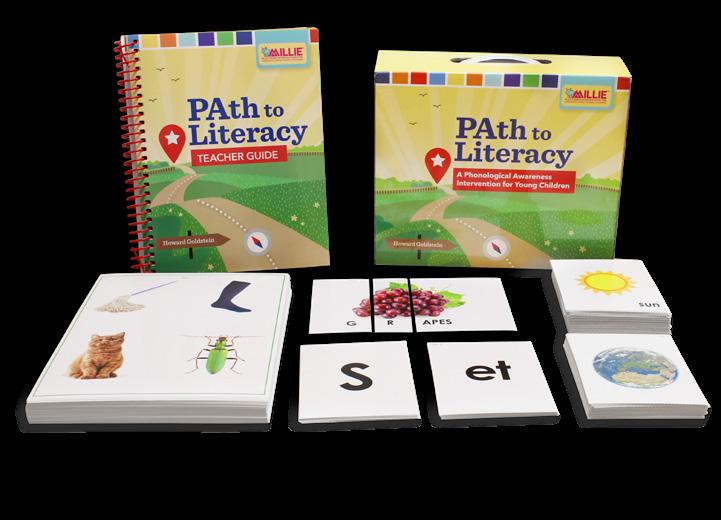
Build phonological awareness and alphabet skills through fun activities and word games. Teach young children how to blend and segment words, master letter–sound correspondence, and more.
By Howard Goldstein, Ph.D., CCC-SLP
$149.95 | Stock #: 21102-51950 | 2016 | ISBN 978-1-68125-195-0 9
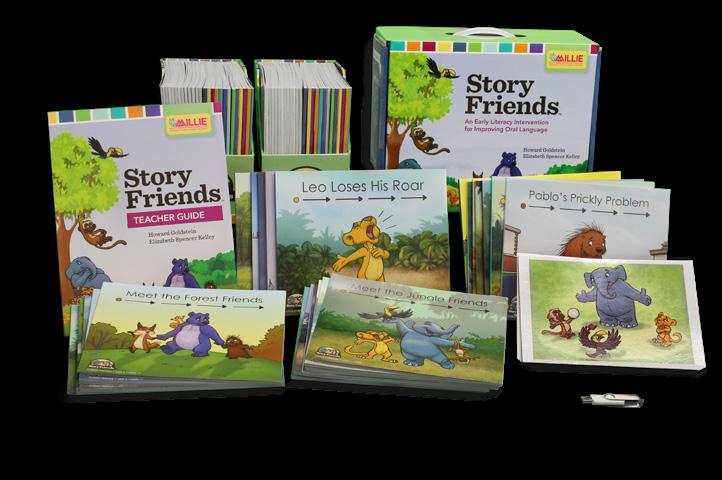
Story Friends™
Boost word learning through 26 interactive storybooks. By Howard Goldstein, Ph.D., CCC-SLP, & Elizabeth Spencer Kelley, Ph.D., CCC-SLP
Specialist’s Kit (one-to-one use): $599.95 Stock #: 21102-51301 | 2016 | ISBN 978-168125-130-1 Classroom Kit (small group use, contains 2 extra storybook sets): $1,199.95 | Stock #: 21102-51288 | 2016 | ISBN 978-1-68125-128-8
Assessment of Story Comprehension (ASC™)
Measure listening comprehension skills with this quick check that takes just 3 minutes to complete. By Trina D. Spencer, Ph.D, BCBA-D, & Howard Goldstein, Ph.D., CCC-SLP
$65.00 | Stock #: 21102-52384 | 2019 | ISBN 978-1-68125-238-4
ABC Foundations for Young Children
A Classroom Curriculum
By Marilyn Jager Adams, Ph.D. “An excellent example of research-based instruction . . . artful and engaging.“
— Joseph Torgesen, Emeritus Professor, Florida State University
Answer the call for effective alphabet instruction with this playful curriculum supplement for preK–kindergarten (and primary-grade students who need help with alphabet basics). The 56 engaging lessons help children recognize and write each letter and know the primary sound each letter represents. Built around fun, fast, hands-on activities that keep all children engaged, ABC Foundations includes assessments for monitoring children’s progress and needs and lesson support materials such as Alphabet Game Cards, Alphabet Strips, and Letter Writing Activity Sheets.
By C. Melanie Schuele, Ph.D., CCC-SLP, & Naomi D. Murphy, M.S., CCC-SLP
BESTSELLER! Transform struggling readers into successful readers with this evidence-based supplemental Tier 2 curriculum for Grades K–2, developed by SLPs. Use the IPA program to deliver systematic, intensive phonological awareness instruction— and get results in just 30 minutes, three times a week! You’ll get suggested scripts and teaching strategies, plus more than 100 pages of content available for download, including game boards, implementation checklists, and picture cards.
$39.95 | Stock #: 21102-71189 | 2014 | 180 pages | 8 ½ x 11 | layflat paperback | ISBN 978-1-59857-118-9
ASSESS YOUNG BILINGUAL CHILDREN
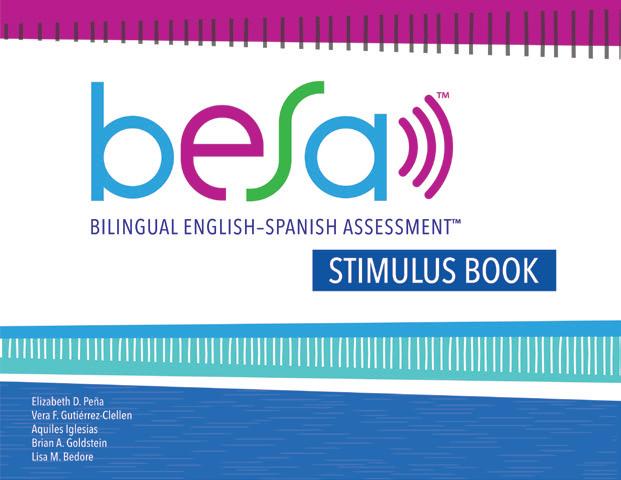
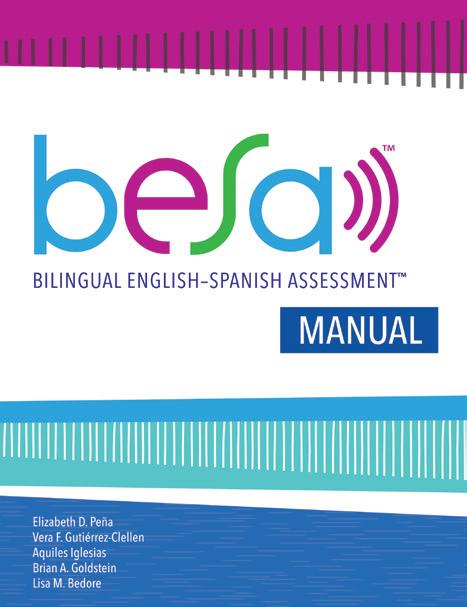
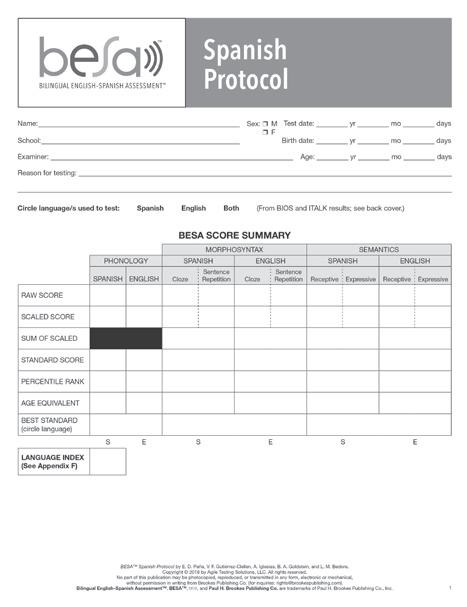
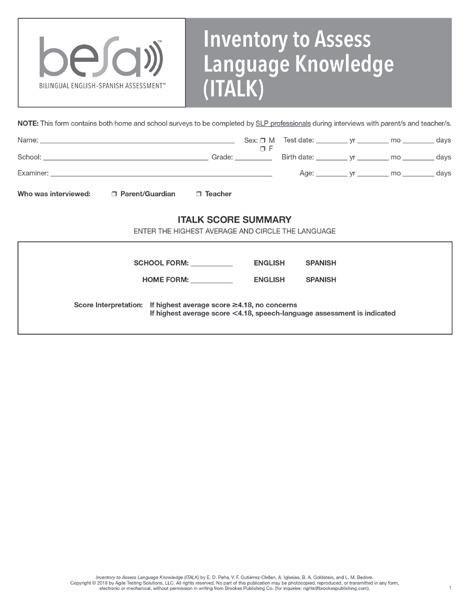
BESTSELLER!
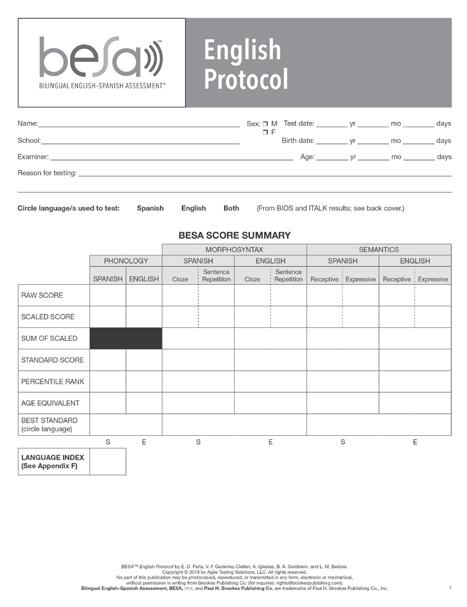
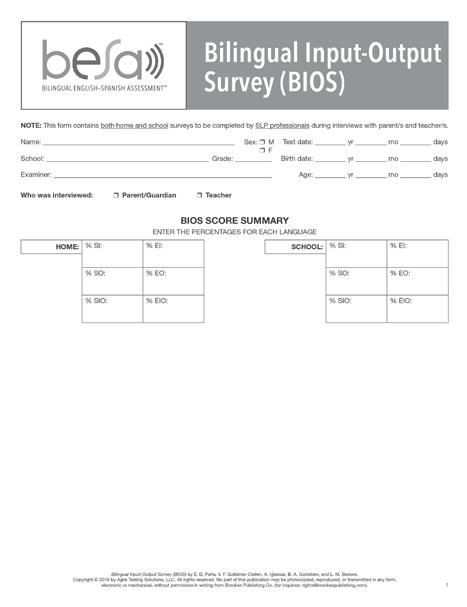
How BESA Works
Through a combination of subtests for students and surveys for teachers and parents, BESA reveals the big picture of a young bilingual child’s language development. BESA includes: • 3 subtests (in both English and Spanish) that address the key domains of morphosyntax, semantics, and phonology. • 2 questionnaires: the Bilingual Input-Output
Survey (BIOS) and the Inventory to Assess
Language Knowledge (ITALK) • Pragmatic activity used to establish rapport with the child and give clinicians an idea of how interactive the child will be during the assessment.
Bilingual English–Spanish Assessment™ (BESA™)
By Elizabeth D. Peña, Ph.D., CCC-SLP, Vera F. Gutiérrez-Clellen, Ph.D., CCC-SLP, Aquiles Iglesias, Ph.D., CCC-SLP, Brian A. Goldstein, Ph.D., CCC-SLP, & Lisa M. Bedore, Ph.D., CCC-SLP
When a young bilingual child experiences language difficulties, it can be hard to tell if those challenges are due to a disorder or just limited exposure to the English language. Now there’s a valid, reliable assessment that specifically responds to the needs of young Spanish-English bilingual children. For use with children ages 4 through 6 years who have varying degrees of bilingualism, the Bilingual English–Spanish Assessment (BESA) was developed to: • Identify phonological and/or language impairment in bilingual children and English language learners using a standardized protocol • Differentiate between a delay in English language acquisition and a true language disorder • Document children’s speech and language strengths and needs • Monitor children's progress in both languages and use the information to make decisions about intervention
BESA BENEFITS • Valid and reliable • Culturally and linguistically appropriate • Helps you gauge progress in both languages • Flexible and convenient—use each BESA component independently or combine them as part of an assessment battery
INTRODUCTORY PRICE: $550
Stock #: 21102-52797 | 2018
BESA KIT (Test Manual, stimulus book, protocols in English and Spanish, BIOS forms, and ITALK forms)
“BESA is the one assessment that I trust to help me make better clinical decisions regarding my bilingual clients’ presence of a communication disorder. I believe BESA represents the growing demand for tools that more precisely identify communication disorders in diverse populations. I am exultant to know BESA is currently available!“
—Xigrid Soto, Ph.D. candidate at University of South Florida “Measures like the Bilingual English–Spanish Assessment (BESA) are critically needed to comprehensively examine the language development of bilingual preschoolers. I commend the authors for the rigorous research undertaken to produce such an important measure for the field and, most importantly, for young bilingual children.“
—Sandra Barrueco, The Catholic University of America
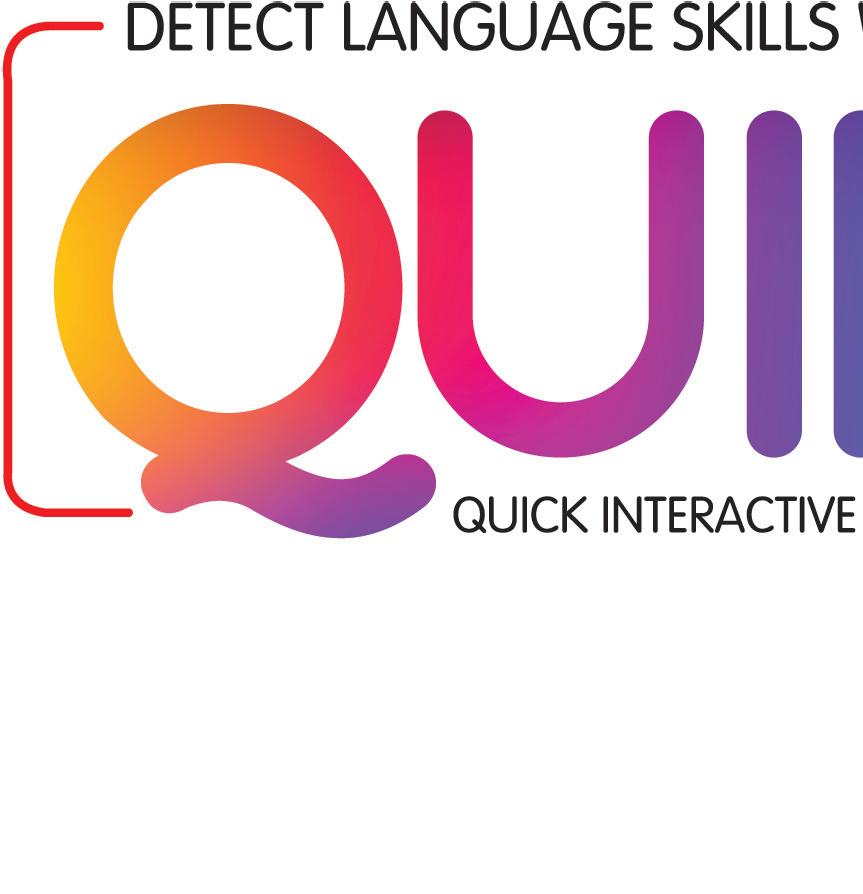
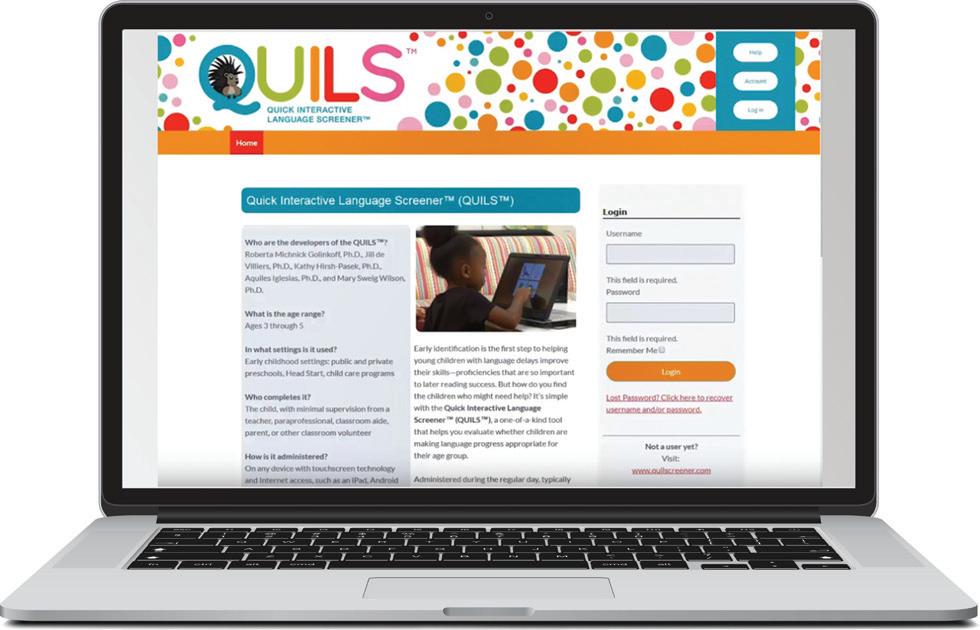

Early identification is the first step to helping young children with language delays get on track for reading proficiency and school success. But how do you find the children who might need extra support? It’s simple with QUILS™, two game-like, web-based screeners that help you evaluate the language skills of children ages 3 through 5 years—and make sure their progress is appropriate for their age group.
Remote screening guidance for QUILS is available now! Download it here: http://bit.ly/QUILS-Remote
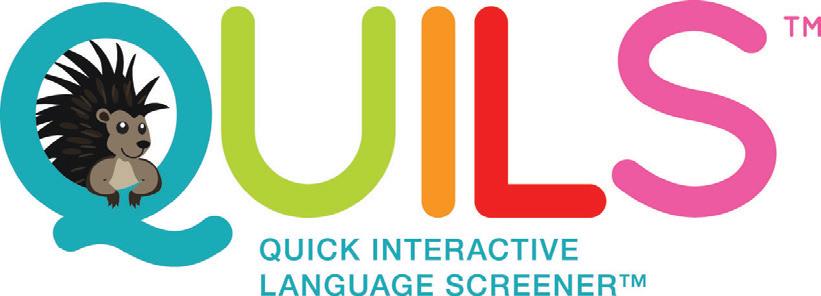
By Roberta Michnick Golinkoff, Ph.D., Jill de Villiers, Ph.D., Kathy Hirsh-Pasek, Ph.D., Aquiles Iglesias, Ph.D., CCC-SLP, & Mary Sweig Wilson, Ph.D., CCC-SLP
Stock #: 21102-52308 | 2017 For monolingual English students, use QUILS™, an expert- developed interactive screener you can administer on a touchscreen tablet or computer. QUILS accurately measures children’s language comprehension skills in three key areas: vocabulary, syntax, and process. 3 Engaging interactive items and cartoon illustrations 3 Automatically generated scores and reports 3 Quick and easy—takes just 15−20 minutes 3 No special training required
For English–Spanish bilingual children, now there’s the new QUILS™: ES! Like the QUILS screener, QUILS: ES looks at vocabulary, syntax, and process—but to give a comprehensive picture of the skills of bilingual children, QUILS: ES consists of separate English and Spanish sections. Normed on bilingual English–Spanish students, it offers a full picture of language development across both languages and is sensitive enough to pinpoint potential language delays and difficulties in bilingual children.
By Aquiles Iglesias, Ph.D., Jill de Villiers, Ph.D., Roberta Michnick Golinkoff, Ph.D., Kathryn Hirsh-Pasek, Ph.D., & Mary Sweig Wilson, Ph.D. Stock #: 21102-52346 | 2021
COMING SOON
ORDER QUILS | WATCH A DEMO | GET A FREE TRIAL Visit http://quilscreener.com
YOUR KEYS TO EARLY CHILDHOOD INCLUSION
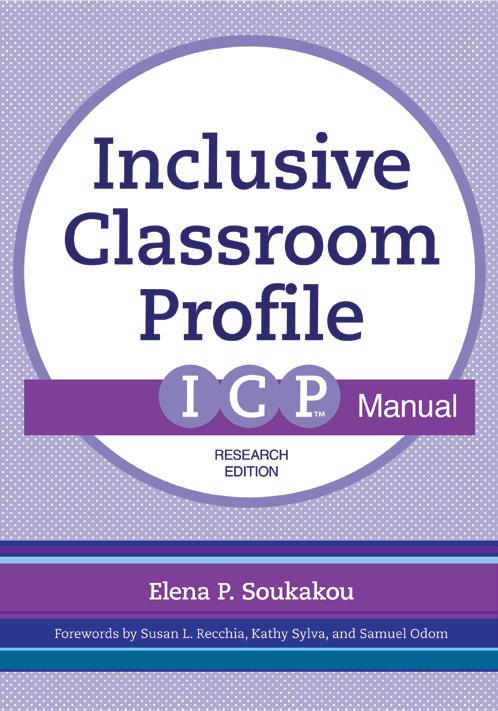
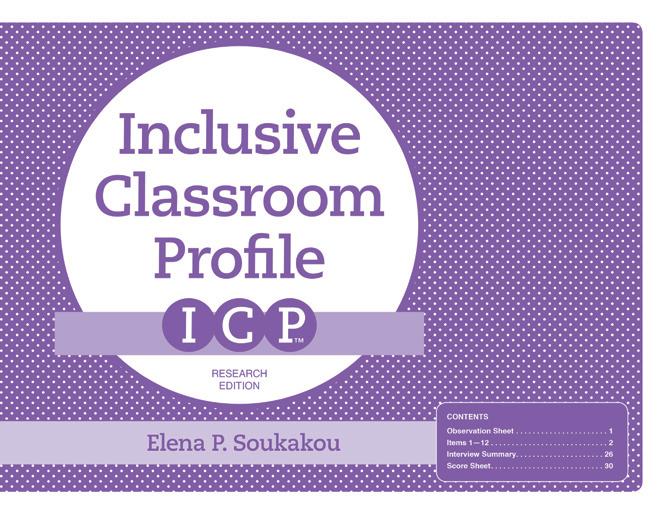
The Inclusive Classroom
Profile (ICP™), Research Edition
By Elena P. Soukakou, Ph.D. How well is your early childhood program implementing quality inclusive practices? This comprehensive, field-tested observational tool uncovers the answers. For classrooms serving children ages 2–5, the ICP™ assesses 12 key practices with a strong research base for supporting the development of young children in inclusive programs, from Adaptation of Group Activities to Family–Professional Partnerships. The in-depth ICP evaluation process gives you the rich information and insights you need to: • assess your program’s current inclusive practices • establish a baseline for measuring future progress • apply recommended inclusive practices for young children • link assessment data with instructional decision-making • tailor professional development to teachers’ specific needs
Order the set (manual and 5-pack of forms)—$70.00 Stock #: 21102-52193 | 2016
LEARN HOW TO USE THE ICP!
Watch the webinar: http://bit.ly/WebinarICP Watch the free, web-based ICP Overview Training at http://bit.ly/ICPoverview and email seminars@brookespublishing.com for information about training seminars.
BESTSELLER!
Building Blocks for Teaching Preschoolers with Special Needs
Third Edition
By Susan R. Sandall, Ph.D., Ilene S. Schwartz, Ph.D., BCBA-D, Gail E. Joseph, Ph.D., & Ariane N. Gauvreau, Ph.D., BCBA-D
Meeker, Ph.D., University of Washington Expanded with timely new content and consistent with DEC Recommended Practices, the third edition of this bestseller will prepare a new generation of early childhood educators to teach and include every child. Like the groundbreaking previous editions, this updated guide gives you three types of evidence-based inclusion strategies: curriculum modifications, embedded learning opportunities, and child-focused instructional strategies. You’ll learn how to apply these strategies to benefit all children and review the latest research supporting the Building Blocks model. (Includes 7 training modules on essential topics!)
$49.95 | Stock #: 21102-53411 | 2019 | 240 pages | 8 ½ x 11 | paperback | ISBN 978-1-68125-341-1
The Preschool Inclusion Toolbox
How to Build and Lead a High-Quality Program
By Erin E. Barton, Ph.D., BCBA-D, & Barbara J. Smith, Ph.D.,
with invited contributors
BESTSELLER! This is the how-to book preschool administrators, school district leaders, and child care directors need to step up the progress of early childhood inclusion through big-picture, systems-level change. From a nationwide survey of IDEA Part B Preschool Coordinators who shared their inclusion challenges, this is a comprehensive toolbox of problem-solving tips, evidence-based practices, practical checklists and handouts.
$37.95 | Stock #: 21102-76672 | 2015 | 216 pages | 8 ½ x 11 | paperback | ISBN 978-1-59857-667-2
SENSITIVE SUPPORTS FOR STUDENTS WHO HURT
Promoting your students’ social and emotional well-being has always been important—but as every member of your school community continues to struggle with the challenges of COVID-19, it’s never been more critical to provide trauma-sensitive social-emotional and behavioral supports.
On the next few pages, you’ll find expert-developed resources to help you integrate traumasensitive teaching practices, support grieving students, promote positive behavior, and teach key social-emotional skills your students can use to cope with big emotions and tough challenges, both at school and at home.
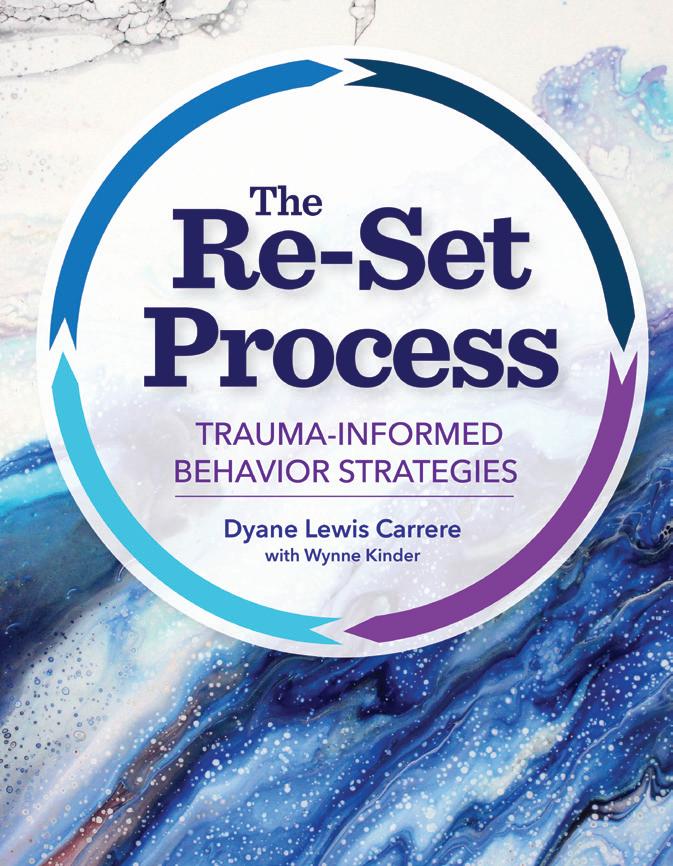
Visit the Brookes Inclusion Lab to read Dyane Carrere's guest blog posts on the Re-Set Process:
The Re-Set Process for Educators: Self Care in the Time of COVID-19 https://bit.ly/Re-Set-Blog The Re-Set Process for Students: Self-Regulation in the Time of COVID-19 https://bit.ly/Re-Set-Blog2
The Re-Set Process
Trauma-Informed Behavior Strategies
By Dyane Lewis Carrere, M.Ed., with Wynne Kinder, M.Ed.
NEW
“Implementing the Re-Set Process and associated practices have been game-changers for many of our students with
trauma.”—Angela Marley, School Principal, Denver Elementary School, Cocalico School District, PA
“The Re-Set Process is one of the most comprehensive approaches to teaching a struggling student the skills for
self-management.”—Melinda Wells, School Principal, Martin Luther King Jr. Elementary School, School District of Lancaster, PA
When students with histories of trauma struggle with self-regulation and challenging behaviors, traditional interventions often fall short. That’s why the teachers on your staff need this reader-friendly guide to the revolutionary Re-Set Process, a four-step, neuroscience-based approach to improving behavioral success for children in Grades K–8 with a history of trauma. This comprehensive guide to the Re-Set Process shows educators how to: • Interpret students’ behavior through a trauma-informed lens • Address challenging behavior proactively and reactively • Manage classrooms effectively by creating predictability, protecting emotional safety, and nurturing relationships • Build students’ regulation skills with a wealth of activities and exercises • Successfully implement the Re-Set Process with clear step-by-step instructions • Provide timely, specific behavioral feedback that promotes a positive classroom culture • Integrate essential self-care strategies into the school day PRACTICAL MATERIALS: Case studies, insightful Notes From the Field, and a package of more than 30 online downloads, including planning forms, blank templates, activity sheets, and a book study guide.








